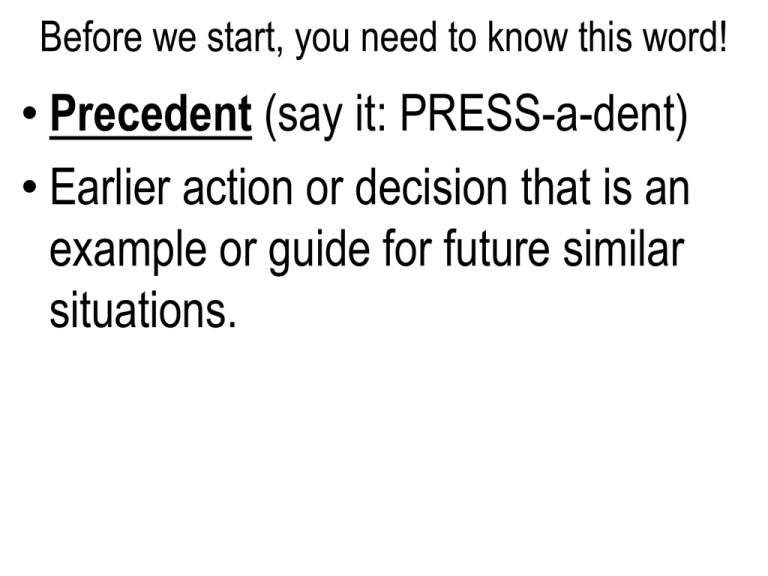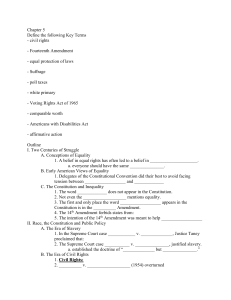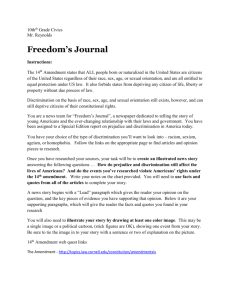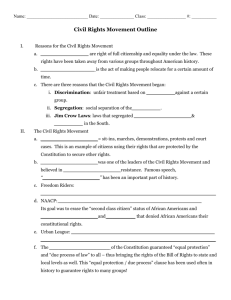File
advertisement

Before we start, you need to know this word! • Precedent (say it: PRESS-a-dent) • Earlier action or decision that is an example or guide for future similar situations. Constitutional Law: Individual rights and responsibilities The Constitution • Basic framework of the government • Adopted in 1787 – Bill of Rights (1st ten amendments) ratified in 1791 • Establishes the 3 branches of government • Lists gov’t powers and limits • Lists people’s freedoms that can’t be taken by the gov’t What the Constitution does & does NOT do: • Constitution protects people from government actions, not other private citizens (that’s what other laws are for) • Guarantees Americans certain basic rights, BUT – Doesn’t contain ALL of our rights…laws are another way to guarantee our rights. – Constitutional rights are NOT absolute • ex: no one has freedom of speech in every situation Supremacy Clause • Says the Constitution and federal (national) laws are the “supreme law of the land” • States are not supposed to make laws that go against the Constitution or federal laws “This Constitution, and the Laws of the United States which shall be made in pursuance thereof; and all treaties made, or which shall be made, under the authority of the United States, shall be the supreme law of the land; and the judges in every state shall be bound thereby, anything in the constitution or laws of any state to the contrary notwithstanding.” Art. 6, Clause 2 Changing the Constitution • Amendment: any change or addition to the Constitution • Only 27—it’s difficult to change the Constitution on purpose • Process: – Proposed by 2/3 of both houses of Congress – Ratified by ¾ of the states Principles of the Constitution Republicanism • This meant representative democracy to the founding fathers • The people express their will through elected representatives Popular Sovereignty • The people (or public) have the right to rule • People elect their leaders & can reject/replace ones that serve poorly Limited Government & Rule of Law • The government can only do what the people allow (Const. lists what they may/may not do) • Law applies to everyone, even the leaders Separation of Power • The division of authority into 3 branches: legislative, executive & judicial • Idea from philosophe, Montesquieu Checks & Balances • To keep any one branch from becoming too powerful, each has ways to check (limit) and balance (even out) the powers of the others. Federalism • Power is shared by the levels of government (federal, state & local) Enumerated / Expressed Concurrent Powers • Specifically given to the National Government • Ex. Coin money, declare war Powers • Shared powers • Ex. Taxing, enforcing laws Reserved Powers • Powers not given to the Federal government are kept by the states • Ex. Conduct elections, provide education Judicial Review • Established by the case Marbury v. Madison • Although this power is not stated in the Constitution, it is VERY important • Set the precedent (example): – Supreme Court has the authority to determine if a law is constitutional or unconstitutional The Bill of Rights • Introduced by James Madison • Proposed by Congress in 1789 & came into effect in 1791 • Added by the Federalists persuade Anti-Federalists to ratify the Constitution. • The first 10 amendments to the Constitution 1. Protect people’s personal freedoms & rights from the government 2. Reserves some powers to the states • Originally applied only to the federal government; now applies to states through the 14th Amendment. Balancing Test • Used by judges to determine which interest is most important (freedom of speech to yell fire OR the interest of all the people in the theater?) Freedom of Speech/Expression • Allows citizens to be exposed to different points of view • People are protected by the 1st amendment even if others do not agree with what they are saying • Cases are difficult for courts to resolve • But, the government can limit speech based four qualities: – Obscenity, defamation, commercial speech, and fighting words Obscenity • Anything relating to nudity/sex in an very indecent, offensive or shocking way • Miller v. California (1973): Developed a 3 part test to determine if a work is obscene. 1. Would the average person find the work inappropriate when applying contemporary standards? 2. Does the work depict sex in an offensive way? 3. Does the work, as a whole, lack literary, artistic, political, or scientific value? – Ex: Anatomy book v. pornography Defamation • Defamation: a false expression about a person that damages a person’s reputation – Slander: when defamation is spoken – Libel: when defamation is written Commercial Speech • Speech that is directed at buying or selling of goods and services (advertising) – Government is allowed to ban adverting that is false, misleading or provides info about illegal products Fighting Words, Offensive Speakers, and Hostile Audiences • Fighting Words: words spoken face to face that are so abusive that they are likely to cause a fight between the speaker and person being spoken to. • Clear and Present Danger Test: used by courts to restrict speech when the government thinks the speech will cause danger (used in the 1950’s) – The right of the speaker v. the harm the speaker proposed Incitement Test • Used by the courts to determine whether to restrict or punish expression based on its potential to cause unlawful behavior (gives the speaker greater protection than the clear present danger test) Hate Speech • Bigoted speech attacking a social or ethnic group or member of the group • Supporters of punishment for hate speech argue… – It has lasting impacts for victims – Can amount to fighting words and cause violence • Those against punishment for hate speech argue… – It allows government censorship – No matter how unpopular what someone is saying is; they still have the right to say it Time, Place, and Manner Restrictions • There are laws that regulate when, where, and how a speech is allowed – EX: Do you need a permit? Have to be in a public place? Limit where posters can be displayed? • Public Forum: any place, such as a park or street, where people are generally open to freedom of expression Symbolic Speech • Actions that express an idea or opinion (sit ins, demonstrations, flag waving, posters, clothing) without saying a word. • To punish someone for symbolic speech the government must show good reason, not just that they didn’t agree Vagueness and Overinclusive Laws • Laws governing free speech must be clear and specific – Vagueness: not clear or specific – Over inclusive: laws must be narrowly written to address ONLY the goal of the government Precedent-setting speech cases • Extensions • West Virginia Board of Education v. Barnette – Don’t have to say the pledge • Tinker v. Des Moines – Students still have freedom of speech as long as it’ doesn’t interfere with education/safety • Cohen v. California – To use certain offensive words • Buckley v. Valeo – To give money to political campaigns • Virginia Board of Pharmacy v. Virginia Consumer Council – To advertise commercial products and professional services • Texas v. Johnson – To burn the flag (symbolic speech) Precedent-setting speech cases • Limits • Schenck v. United States – To incite actions that would harm others • Roth v. United States – To make or distribute obscene materials • United States v. O’Brien – To burn draft cards as an anti-war protest • Hazelwood School District v. Kuhlmeier – To permit students to print articles in a school newspaper over the objections of the school administration. • Bethel School District #43 v. Fraser – Of students to make an obscene speech at a school-sponsored event • Morse v. Frederick – Of students to advocate illegal drug use at a school-sponsored event Freedom of the Press • Guaranteed by 1st amend., often considered part of freedom of speech. • Protects us from government censorship: when the gov’t prohibits publications it finds offensive • Complete “The Case of the Gag Order” and be prepared to discuss. Prohibiting Publication • Prior Restraint: Government stopping a publication before it is released • Only allowed when… – Publication would cause harm – No lesser means would prevent the harm – The prior restraint would be effective in avoiding harm • http://www.youtube.com/watch?v=w0bIOMQIAKs • http://wikileaks.org/ Freedom of Information Act (1966) • Requires federal agencies to release info in their files to the public – Unless it affects national defense, foreign policy, etc... – States have similar laws that give access to state records. Requiring the Press to Disclose Information • Do reporters have the right to keep information from the government? – Ex. a confidential witness gives info to a reporter…does the reporter have to tell the government? • Shield Laws: Protect journalists from being subpoenaed and forced to release their sources – 49 states and D.C. have one – Federal gov’t does not currently have one Limited expression in special places • In schools – Students DO have the right to expression: Tinker v. Des Moines, WV State Board of Education v. Barnette – But it can’t be obscene, inappropriate or advocate for illegal activities: Bethel v. Fraser, Hazelwood v. Kuhlmeier, Morse v. Frederick • In the military – People in the armed forces can’t publish info or make statements which would put the unit or its cause in danger • In prisons – If a law interferes with someone’s rights, the law is upheld as long as it supports the corrective process. Freedom of Religion • Protected by two clauses in the 1st Amendment The Establishment Clause • Forbids the government from creating an official religion • Are the church and government separate? – Example of how they ARE and how they ARE NOT? • “Separation of church and state” – Not in the Constitution, but explains how the founding fathers felt about state-sponsored religion The Free Exercise Clause • Exercise = Practice • Protects the rights of individuals to worship or believe as they choose – Includes right to NOT practice • While religious belief is protected, religious action can be restricted. Lemon Test • Three part test started by Lemon v. Kurtzman (1971) to evaluated challenges to the Establishment Clause. • In order for whatever the “state” (government) did to be considered valid (NOT violated the 1st amendment Establishment Clause) it has to pass all three parts of the test. Lemon Test 1. Purpose: the action has to have a legitimate purpose (other than promoting/discouraging a religion) 2. Effect: the principle or primary effect cannot advance (promote) or inhibit (discourage) religion 3. Entanglement: there must be no excessive government entanglement with religion Due Process of Law • Idea of legal fairness • Part of the 5th and 14th Amendments – 5th: limits the power of the federal government – 14th: limits the power of state and local governments Two Types • Procedural Due Process – Citizen’s right to fair access & treatment in the legal system • Substantive Due Process – Protects basic freedoms by making sure the gov’t does not violate a fundamental right without good reason Procedural Due Process • Fair procedures to prevent unreasonable gov’t actions • Doesn’t mean citizens have to like the gov’t action • At the minimum it means… – Citizens affected by a government decision must be given notice of what the government plans to do – Citizen must have a chance to comment on the action before it occurs Due Process procedures may include: 1. 2. 3. 4. 5. 6. 7. A hearing before an impartial person Representation by an attorney Calling witnesses Cross-examining witnesses Written decision with reasons Transcript of proceedings An opportunity to appeal Proving a procedural due process violation Life Liberty Property • Show that the government deprived you of a non-trivial protected interest (listed above) • Show that your loss of the process outweighs the government's interests in not giving you the process in question. • Procedures required depend on: – The seriousness of the harm to the citizen – Risk of an error without the procedure – Cost to the gov’t for carrying out the procedure Substantive Due Process • When laws affect fundamental rights, the gov’t must show a compelling (very strong) interest in limiting it – Fundamental rights such as marriage, have & raise kids, travel, privacy etc. • Example of a compelling interest: – Citizens have the right to have children – But children can be removed from abusive parents because the gov’t has a VERY STRONG interest in protecting children Right to Privacy • The Constitution doesn’t outright guarantee privacy • Instead it creates “zones of privacy”: – Freedoms of speech and association (1st) – Freedom not to quarter soldiers (3rd) – Freedom from unreasonable searches and seizures (4th) – The right to remain silent (5th) – Unspecified people’s rights (9th) Right to Privacy • Deciding a constitutional right to privacy involves weighing competing private interests and government interests • Ex: The right to privacy of sex offenders v. the public’s right to know and to protect children • http://sexoffender.ncdoj.gov/ Privacy in the Home • People have a reasonable amount of privacy in their homes – Need a search warrant to search a person’s home – Unwarranted searches are permitted in houses with consent, if it’s in plain view, if the police are in hot pursuit or it’s an emergency situation. • (more on that in our upcoming criminal unit) Privacy at School • • • • Students’ right to privacy is very limited at school. Schools do not need a warrant or probable cause They just need a “reasonable suspicion.” Family Educational Rights and Privacy Act (FERPA): parents can inspect their child’s records and the school cannot release records without the parent’s permission Information Gathering and Privacy • Computers & the internet allow businesses and organizations to collect and store detailed information about people. • Sometimes people’s information is sold to other businesses and other organizations. The Privacy Act of 1974 • Prevents the government from releasing most information about an individual without that person’s written consent (medical, financial, criminal, and employment records) – Ex: Banks are required to keep copies of all checks written or deposited by customers. However, customers must be notified if their records are requested for an investigation. USA Patriot Act • Passed after Sept 11, 2001 – Uniting (and) Strengthening America (by) Providing Appropriate Tools Required (to) Intercept (and) Obstruct Terrorism Act of 2001 • Federal law enforcement officials can request records needed to investigate terrorism without a warrant or probable cause • http://www.youtube.com/watch?v=xgAzthHQq9A&feature=fvw Reproductive Rights and Privacy • Pro-Life argument: life begins at conception and must be protected from that moment on • Pro-Choice argument: women should be allowed to control their own body and not have laws to regulate personal choices – These are the extremes, there are plenty of people with beliefs somewhere between these • Roe v. Wade: A women has the legal right to abortion in certain circumstances, but it is not absolute. • http://www.youtube.com/watch?v=T_MUUvcvjEg • Complete 42.5 a-b only on p. 497. Discrimination • Occurs when people are treated differently than others because of race, age, gender, or religion, etc. • Not all types are illegal or unfair. – ex: driver’s license discriminates based on age but its not unreasonable • Government uses laws, regulations, amendments & court decisions to address it Plessy v. Ferguson (1896) • Ruled that segregation is permissible in public facilities (Schools, restaurants, train cars, restrooms, etc). • Created the “separate but equal” rule. Brown v. Board of Education (1954) • Ruled that separate is unequal • Public facilities should be desegregated “with deliberate speed.” • http://www.youtube.com/watch?v=TTGHLdr-iak After the Brown decision • The Civil Rights Acts of 1964 and 1968 prohibited discrimination based on race, sex, and national origin in employment and housing • Today we also have to consider age, gender, disabilities, citizenship status, sexual orientation • http://www.youtube.com/watch?v=RGjNqrQBUno The Rational Basis Test • Judges can uphold a law or practice that treats people differently if there is a rational basis for the different treatment. – Rational basis: a logical relationship between the treatment and the purpose of the law – Ex: legal age to marry The Strict Scrutiny Test • Law or practice is unconstitutional unless the state can show the discrimination serves an important interest and there is no less discriminating way to address it. – Ex. Instead of making a law against religious animal sacrifices, create a law that makes any animal sacrifices illegal (not just religious ones) The Substantial Relationship Test • Used in gender discrimination cases • Must be a close connection, not just a rational relationship, between the law and its purpose. • Any law that classifies based on gender must serve an important governmental purpose. – Try it: Women cannot talk on the phone while driving because there have been more accidents involving women – Unconstitutional: no connection between women’s accidents and phones Integration in schools • In Schools: After Brown, states used many methods: choice plans, redrawing districts, transferring teachers & busing • Swann v. Charlotte-Mecklenburg Schools (1971): Supreme Court ruled to use forced bussing to integrate schools – Overturned in 2002 • Are we integrated? – Actions needed? Affirmative Action • Taking steps to remedy past and current discriminations in employment and education. – Is it equal opportunity or reverse discrimination? • Methods used to increase minorities in educational programs: quotas, goals & preferences • Regents of the University of Cali v. Bakke (1978): – Racial quotas are illegal but race can be one of the factors considered for admission • http://www.youtube.com/watch?v=Z1flZFbZiB4 Discrimination in Employment • Civil Rights Act of 1964: Title VII: – prohibits discrimination in employment based on race, color, sex, religion, or national origin – by businesses with more than 15 employees or labor unions. Discrimination in Voting Rights • 15th amendment: vote regardless of race, color, or previous servitude – Ways around it: poll taxes (24th amend. ended that), literacy tests, grandfather clauses & intimidation – National Association for the Advancement of Colored People (NAACP): works to end discrimination, equality in housing, employment, voter registration & health care • 19th amendment: women’s suffrage Discrimination in Voting Rights • Gerrymandering: drawing Congressional district lines to strengthen the voting power of a particular group of people • NC District 12 Collective Rights • When society recognizes that groups having a common culture, racial or ethnic heritage, religion, or language possess rights as a group • Constitution & Bill of Rights focuses on individual rights, not collective rights but… – + community oriented; people work together to solve societal problems. – -dividing ourselves into subcultures results in voting for people based on the candidate’s group rather than issues. Discrimination Based on National Origin/Citizenship Status • Most government laws & policies that discriminate based on national origin and citizenship status have been struck down by the courts – Treat people as a group rather than as individuals • http://www.youtube.com/watch?v=7rnJbBQCHi4 • http://www.youtube.com/watch?v=5XnF4WwgyAo Discrimination Based on Gender • 1848: women’s rights convention in Seneca Falls, NY. – Demanding political, social, and economic equality, as well as the right to vote. • 1920: 19th Amendment was finally passed • 1963 Equal Pay Act: illegal to pay women less money than men for doing the same job Discrimination Based on Gender • 1982: Equal Rights Amendment (ERA) failed, would have made it illegal to pass/enforce laws that discriminated based on gender • Women use the 14th amendment “equal protection clause” to fight discrimination • The Equal Employment Opportunity Commission (EEOC) is responsible for investigating charges of discrimination • http://www.youtube.com/watch?v=NhVOdsWI88U • http://www.youtube.com/watch?v=iA3vGtMctUU&NR=1 Sexual Harassment • Unwelcome sexual advances, requests for favors, verbal or physical conduct of a sexual nature • Quid Pro Quo: “this for that” – ex: promotion for sexual favors • Hostile Environment: unwelcome sexual conduct that is so severe that it changes the conditions of the environment (work/school etc) • Can be made to a member of the same or opposite sex Sexual Harassment at School • Includes a teacher against a student, a student against a teacher, or from one student to another • Employers are liable for its employees’ sexual harassment unless – they prove they took reasonable steps to prevent harassment – and the alleged victim failed to take advantage of policies • http://www.youtube.com/watch?v=jXQTSmeoeV8&featu re=related Title IX of the Education Act of 1972: • Prohibits gender discrimination in most school activities, including curriculum, faculty hiring, and student athletics • Sports programs must accommodate the interests and abilities of both sexes Discrimination Based on Sexual Orientation • Congress has not passed any laws to protect people based on sexual orientation (although some states have) – Employment Non-Discrimination Act passed in the Senate, currently in the House – Many seek equal rights in marriage, employment and housing, and the military regardless of orientation Discrimination in the Military • 1993: Bill Clinton passed “Don’t Ask, Don’t Tell,” members of the armed services could not be forced to reveal their sexual orientation. – However, if they did reveal that they were gay, lesbian, or bisexual they would be discharged. • Was the official policy until September 2011 • http://www.youtube.com/watch?v=6WdPQbhN4wg&feat ure=fvsr • http://www.youtube.com/watch?v=zhdvGG05rqM Discrimination Based on Disability • Rehabilitation Act of 1973: bans discrimination in employment – Requires employers who receive federal benefits set up programs to assist people with disabilities • Individuals with Disabilities Education Act (IDEA): states provide a free and appropriate education to children with special needs in the least restrictive environment Americans with Disabilities Act (ADA): • Brings people with disabilities into the economic/social mainstream of society • Individual with a disability is entitled to reasonable accommodations in order to overcome existing barriers – Ex: making facilities accessible, modifying training materials, providing interpreters, parking Housing Discrimination • Fair Housing Act of 1973: forbids discrimination in the leasing, selling, or financing of housing based on race, color, religion, gender, national origin, or disabilities • Steering: directing buyers or renters to particular areas because of their race, etc. • Not all housing discrimination is illegal: can refuse to rent to people who have poor credit history • Contact Housing and Urban Development (HUD) if you think you have been discriminated against State and Local Laws Against Discrimination • Most state laws prevent discrimination based on even stricter characteristics: – Age – Marital status – Personal appearance – Income – Sexual orientation – Family responsibility (kids) – Physical handicap – Political affiliation





